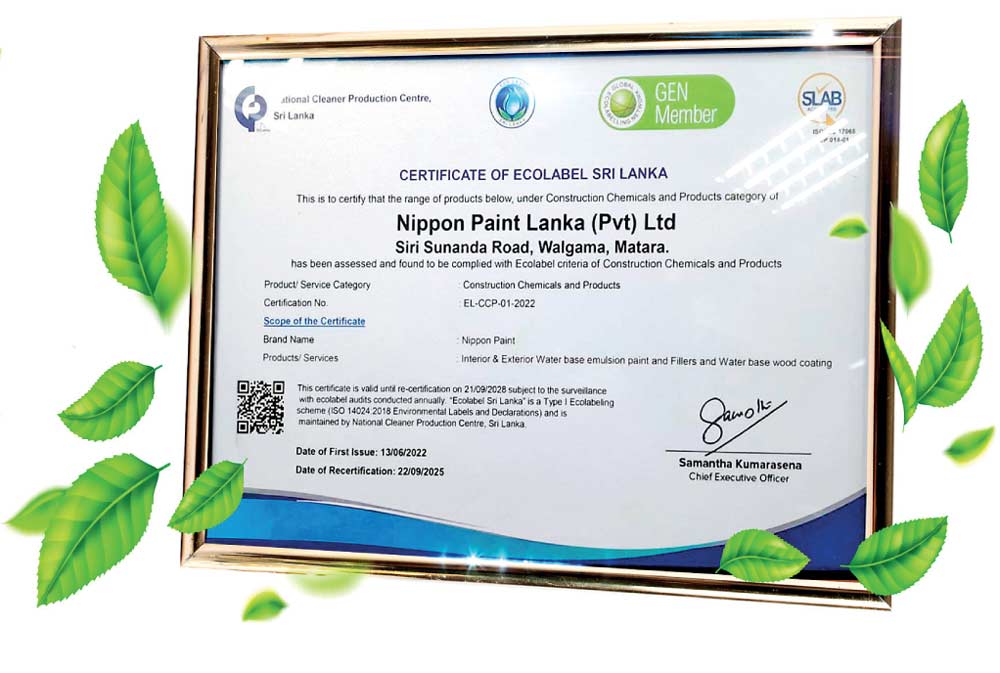Sunday Feb 22, 2026
Sunday Feb 22, 2026
Thursday, 23 October 2025 11:46 - - {{hitsCtrl.values.hits}}

By Safrah Fazal
Nippon Paint Lanka was recertified with the Eco-Label Sri Lanka recognition this year, reaffirming its commitment to delivering products that are safe for the environment and humans. The company became the first paint manufacturer in Sri Lanka to obtain the Eco-Label certification back in 2022.
Amid growing discussions on sustainability and environmentally responsible practices, Nippon Paint sought the Eco-label Sri Lanka to stand out from greenwashing. For the company, ecolabelling is not merely a certification but a milestone in its broader mission to achieve carbon neutrality by 2050.
Why Eco-Label Sri Lanka?
Among the various ecolabelling certifications in Sri Lanka, Nippon Paint Lanka chose the Eco-Label Sri Lanka certification administered by the National Cleaner Production Centre (NCPC) for its credibility, reliability, and global alignment. The NCPC is nationally and internationally accredited, recognised by the Sri Lanka Accreditation Board (SLAB) under ISO 17029, ISO 14065, and ISO 17024, and registered with both the Sri Lanka Sustainable Energy Authority (SLSEA) and Central Environmental Authority (CEA).
Launched in 2018 by the United Nations Environment Programme (UNEP) under the 10-Year Framework on Sustainable Consumption and Production, Eco-Label Sri Lanka supports the shift toward sustainable production practices. It gained global recognition in 2021 as a full member of the Global Ecolabelling Network (GEN), and in 2024, it received SLAB accreditation under ISO/IEC 17065:2012, while signing Mutual Recognition Agreements (MRAs) with global schemes such as Japan Eco Mark.
Nippon Paint Lanka valued the certification’s GEN affiliation, as GEN represents the world’s only network of Type I ecolabelling programmes that use rigorous, independent, lifecycle-based assessments, ensuring certified products have reduced environmental and social impact throughout their lifecycle.
By obtaining the Eco-Label Sri Lanka certification, Nippon Paint reinforces its commitment to sustainable manufacturing, responsible stewardship, and environmental accountability. This decision aligns with the company’s long-term sustainability strategy, prioritising the development of eco-friendly, low-emission coating solutions that promote healthier living environments. Through this certification, Nippon Paint ensures greater transparency, third-party validation of environmental performance, and compliance with global best practices in sustainability.
Being carbon-neutral by 2050
Nippon Paint Lanka is working towards achieving genuine sustainability that will benefit future generations. As part of its gradual mission to achieve carbon neutrality by 2050, Nippon Paint Lanka is focusing on several areas related to its carbon footprint and sustainable practices.
By 2026, the company aims to ensure that 30% of its packaging materials are recyclable. This includes shifting certain products to tins made from recycled tin sheets, which can in turn be recycled again.
The procurement team is also in discussion with suppliers of biodegradable plastics. Although these materials are more expensive, Nippon Paint Lanka is exploring ways to offer eco-friendly products of high quality at reasonable prices.
The elimination of chromium and cobalt from all its products is a key 2027 goal. While achieving this is technically straightforward, the company is researching solutions to ensure affordability without compromising quality.
By 2030, Nippon Paint Lanka aims to introduce electric vehicles with sodium batteries or vehicles with hydrogen engines into its fleet, with hopes that hydrogen engines will be available by then.
Is Sri Lanka choosing eco-friendly paints?
Several buildings, which were painted using Nippon Paint Lanka’s water-based range, are considered as green buildings. As the demand for green building certification grows, more projects are beginning to choose Eco-Label Sri Lanka certified products.
Nippon Paint’s auto-refinish water-based range is green-certified and safe for both people and the environment. However, a major concern is that many Sri Lankans continue to prefer Nitrocellulose (NC) type paints, which, although affordable, are harmful to humans. Likewise, in the case of wood paints, most still opt for solvent-based products that are equally damaging.
Globally, the paint industry is steadily shifting towards water-based alternatives, and Sri Lanka will also need to follow suit before long. While all airports are now required to use water-based road marking paints, other road markings are also expected to transition soon. These paints are not only environmentally friendly but also easier to apply and do not require highly skilled labour.
Compared to other brands in the market, Nippon Paint Lanka offers a much wider Eco Label Sri Lanka certified water-based range for consumers to choose from.
Sustainable, safer paints
Nippon Paint Lanka also offers a near-zero volatile organic compound (VOC) range called “Odourless.” This range does not emit formaldehyde, which is known to increase health risks. With “Odourless”, a freshly painted room can be safely occupied within just two to three hours. In its commitment to introducing greener products, Nippon Paint also developed an exterior paint with solar-reflective properties. This range can reduce indoor temperatures by around 5 degrees Celsius, helping to lower the need for air conditioning and thereby reducing energy consumption.
Green practices already in effect
Nippon Paint Sri Lanka is already well on its way to achieving its sustainability goals. To reduce energy and water consumption in its factories, the management, along with the Safety and Sustainability team, has implemented several key initiatives.
The wastewater purification plants recycle purified water repeatedly in the production process without releasing it into the environment, while rainwater harvesting systems are used to cool storage buildings. To further reduce fuel consumption, all Nippon Paint delivery vehicles are equipped with tracking devices that direct drivers along the shortest routes, helping to save fuel and minimise time spent in traffic.
Given that Sri Lanka’s economy is closely tied to its environment, Nippon Paint Lanka believes it is essential for the government, businesses and individuals to embrace sustainable practices. As the company continues its steady journey towards carbon neutrality by 2050, it hopes to see a greener Sri Lanka emerge alongside it.
